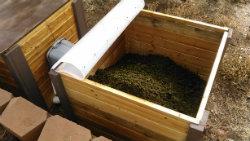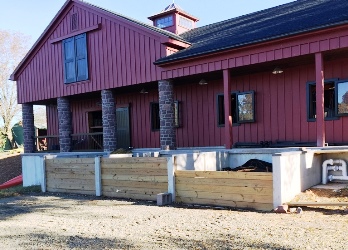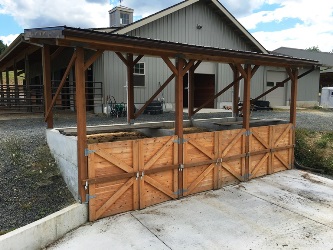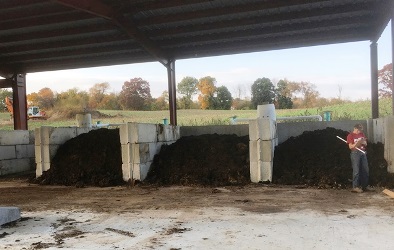|
 |
Newsletter
Winter 2017
|
|
 |
| |
|
Planning for 2017 -
A "Manure Year" Resolution
Happy New Year and welcome to the depths of winter. For most of us, winter means short days, cold weather, and lots of rain and snow. Cleaning stalls becomes a huge chore and dealing with the collected manure poses a wide array of challenges. If you don’t have an O2Compost System, you are likely piling “it” up behind the barn or paying someone to haul it away - but in either case it’s not a sustainable strategy.
While this is not the best time of year to be constructing a compost system (unless you happen to live in Florida or Australia), it is the perfect time to be designing your system and securing a contractor for when the pendulum swings back toward summer. We encourage you to set a plan in motion to construct an O2Compost System on your farm and solve your manure challenges once and for all.
Give us a call. We’ll answer all of your questions and give you whatever time you need to make a decision to join the growing effort to protect our land, air and water resources.
360-568-8085
|
Trends in Composting
By Peter Moon
I just returned from the US Composting Council Conference held in Los Angeles, California. This was the 25th anniversary event with well over 1,500 people in attendance and it was a huge success.
If you are interested in the business of composting, I highly recommend that you attend next year’s event in Atlanta, Georgia. It is complete with a series of workshops and breakout training sessions, an exhibition hall and a demonstration of equipment on the final day.
This is a brief summary of what I view as the current trends in the composting industry.
- Marijuana Growing Media - Twenty-six states currently have laws legalizing marijuana in some form and seven states and the District of Columbia have adopted more expansive laws legalizing marijuana for recreational use. Most recently, California, Massachusetts and Nevada all passed measures in November legalizing recreational marijuana.
As a result, permitted marijuana grow operations are popping up like dandelions in spring and many of these are looking for sources of high quality compost as a component of their growing media. Marijuana compost needs to be nutrient rich, free of weed seeds and plant pathogens and, most importantly, consistent month in and month out. If it meets these specifications, growers will pay a premium price, in some cases 10 – 20 times the value of garden variety bulk compost. This has become a “gold rush” for composters and the need for premium marijuana-compost appears to be insatiable.
- Carbon Sequestration – A great deal of attention is being given to reestablishing healthy soils by applying compost and increasing the soil carbon (organic content) in agricultural and urban soils.
“The soil Carbon sequestration is truly a win–win strategy. It restores degraded soils, enhances biomass production, reduces soil erosion, purifies surface and ground waters, and reduces the rate of enrichment of atmospheric CO2 by offsetting emissions due to fossil fuel.”
Visit: http://www.sciencedirect.com/science/article/pii/S0016706104000266
- Community Composting – there is a large and growing number of community composters who are dedicated to “keeping it local”. These are typically grass roots companies owned and operated by young, passionate and hardworking entrepreneurs. The chances are quite good that your town or city offers a residential collection service or drop off stations for your food scraps at a very reasonable price, accompanied by subscription benefits. If you are looking for ways to help the environment, I encourage you to look into supporting a community composter.
- Food Waste Composting – New legislation in California calls for reduced landfilling of organic wastes, with an emphasis on diverting and composting food waste. This is a national trend that is coming to the forefront in most of the United States, but it poses many challenges and faces potential roadblocks.
While state governments can impose diversion goals on local municipalities, there is a country-wide lack in processing capacity at existing compost facilities. And while the need exists, it is getting ever harder to site and permit new composting facilities in the face of regulatory concerns over volatile organic compound (VOC) emissions, a history at many facilities of off-site odor impacts to neighbors, and a general perception that composting is harmful to our water resources. With the ASP approach to composting, O2Compost can resolve all of these challenges.
- Drone Technology – One of the advances in compost facility management is the use of Unmanned Aerial Vehicles or UAV’s. UAV’s, also known as Drones, have proven to be an excellent tool to view a facility from the sky and to monitor changes in volumes of materials that are in process and in storage. If flown on a scheduled basis (e.g., monthly) it is easy to observe seasonal changes and identify trouble spots in the outer lying areas of a facility.
Drones are inexpensive to purchase (starting at around $750, fully equipped with a still / video camera) easy and safe to fly, and fun to operate. Emerging drone technologies includes precise volume calculations of stockpiles and heat sensors for assessing volatile organic compound (VOC) emissions, and hot spots in the piles which may lead to spontaneous combustion.
|
O2Compost Webinar Series
There is a growing interest in aerated composting on a large (municipal) scale at both publically and privately owned facilities. In response to daily inquiries, O2Compost is planning a series of ten webinars to answer a wide range of questions. If you are interested in attending our webinars in “real time” please contact us and we’ll add your name to our invitation list. We will also record each webinar and add it to the new video page on our website so that you can watch them at your leisure. Each webinar will be 15 to 20 minutes in length and will address a specific topic, including the following:
- Aerated Static Pile Composting – An Introduction and Overview
- Increasing Site Capacity and Annual Throughput
- Resolving Off-Site Odor Impacts and Neighbor Complaints
- Reducing Operating Costs
- Conducting a Pilot Project – How and Why
- A Virtual Tour of Compost Facilities that Utilize the ASP Method
- The Secret of Aeration
- Keys to Success with ASP Composting
- The Biology of ASP Composting
- Composting as a Manufacturing Process
Dates and times will be announced. For more information, contact us at info@o2compost.com.
|
|
FAQ
What about composting during periods of extreme cold?
Answer:
Cold weather composting presents challenges that we don’t face at other times of the year. Specifically, cold air is also very dry air which can have the dual effect of cooling the pile down excessively and drying out the mix to the point that composting simply stops (i.e., less than 45% moisture content). During the cold weather months, we recommend decreasing the blower frequency and On-Time to a bare minimum.
This is particularly true for small piles or bins that have a high surface area to volume ratio. For large piles, cold weather is less of a problem because compost is self-insulating. Quite literally, the biofilter layer on the outside of a large aerated static pile can be frozen solid while the inside of the pile cooks along at 140oF or higher.
Many of our clients operate their systems year round despite severe cold weather conditions, while others take the winter off. In this latter case, we recommend cleaning out the entire system toward the end of November to allow for passive storage through the winter months and resumed aerated composting in the spring.
With our designs we also provide an optional heat cable system to heat the floor of the bin to just above freezing. These heat cables are the same that some people use to thaw out sidewalks and pathways leading up to their homes. This approach is not common, but those who use it are happy that they made the investment.
|
New Compost Systems Come On-Line
 |
OWNER: Dave D.
LOCATION: Sedona, AZ
Using compost to grow alfalfa.
More information on our website.
|
 |
OWNER: Jenny M.
LOCATION: Gladstone, NJ
"Our 12-stall barn can now be mucked very efficiently."
More information on our website.
|
 |
OWNER: Brian and Tammy J.
LOCATION: La Center, WA
"Positive outcomes ... convenience ... no offensive odors..."
More information on our website.
|
 |
OWNER: Matt P. and Dan M.
LOCATION: Woodstock, CT
"I like the simplicity of the O2 system."
More information on our website.
|
|
Coming Events
February and March, 2017
O2Compost Webinar Series for Commercial Scale Composters
Dates and times will be announced.
May and June, 2017
O2Compost Webinar Series for Livestock Owners and On-Farm Composters
Dates and times will be announced.
April 9, 2017
Food Waste Workshop
Solana Center for Environmental Innovation - Encinitas, California
An all-day, hands-on workshop with Peter Moon that focuses on community scale food waste composting.
For more information, visit http://solanacenter.org/about-us/vision
April, 2017
Composting Workshop
North Carolina State University - Raleigh, North Carolina
2-Day Workshop on ASP Composting and Vermi-Composting with Peter Moon and Dr. Rhonda Sherman.
Exact date to be determined.
2017
Quarterly ASP Workshops
- Annapolis, Maryland
Hands-on training in ASP composting for livestock owners in the Chesapeake Bay Watershed.
Dates and times to be announced.
|
|
Protecting Our Land, Air and Water Resources
|
|
O2Compost
Price-Moon Enterprises, Inc.
PO Box 1026
Snohomish, WA 98291
|
Phone: 360-568-8085
Email: info@o2compost.com
www.o2compost.com
|

|
|
